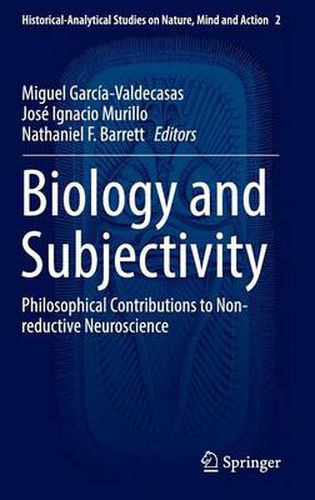Readings Newsletter
Become a Readings Member to make your shopping experience even easier.
Sign in or sign up for free!
You’re not far away from qualifying for FREE standard shipping within Australia
You’ve qualified for FREE standard shipping within Australia
The cart is loading…






This title is printed to order. This book may have been self-published. If so, we cannot guarantee the quality of the content. In the main most books will have gone through the editing process however some may not. We therefore suggest that you be aware of this before ordering this book. If in doubt check either the author or publisher’s details as we are unable to accept any returns unless they are faulty. Please contact us if you have any questions.
Some may consider that the language and concepts of philosophy will eventually be superseded by those of neuroscience. This book questions such a naive assumption and through a variety of perspectives and traditions, the authors show the possible contributions of philosophy to non-reductive forms of neuroscientific research. Drawing from the full range and depth of philosophical thought, from hylomorphism to ethics, by way of dynamical systems, enactivism and value theory, amongst other topics, this edited work promotes a rich form of interdisciplinary exchange.
Chapters explore the analytic, phenomenological and pragmatic traditions of philosophy, and most share a common basis in the Aristotelian tradition. Contributions address one or more aspects of subjectivity in relation to science, such as the meaning and scope of naturalism and the place of consciousness in nature, or the relation between intentionality, teleology, and causality. Readers may further explore the nature of life and its relation to mind and then the role of value in mind and nature.
This book shows how philosophy might contribute to real explanatory progress in science while remaining faithful to the full complexity of the phenomena of life and mind. It will be of interest to both philosophers and neuroscientists, as well as those engaged in interdisciplinary cooperation between philosophy and science.
$9.00 standard shipping within Australia
FREE standard shipping within Australia for orders over $100.00
Express & International shipping calculated at checkout
This title is printed to order. This book may have been self-published. If so, we cannot guarantee the quality of the content. In the main most books will have gone through the editing process however some may not. We therefore suggest that you be aware of this before ordering this book. If in doubt check either the author or publisher’s details as we are unable to accept any returns unless they are faulty. Please contact us if you have any questions.
Some may consider that the language and concepts of philosophy will eventually be superseded by those of neuroscience. This book questions such a naive assumption and through a variety of perspectives and traditions, the authors show the possible contributions of philosophy to non-reductive forms of neuroscientific research. Drawing from the full range and depth of philosophical thought, from hylomorphism to ethics, by way of dynamical systems, enactivism and value theory, amongst other topics, this edited work promotes a rich form of interdisciplinary exchange.
Chapters explore the analytic, phenomenological and pragmatic traditions of philosophy, and most share a common basis in the Aristotelian tradition. Contributions address one or more aspects of subjectivity in relation to science, such as the meaning and scope of naturalism and the place of consciousness in nature, or the relation between intentionality, teleology, and causality. Readers may further explore the nature of life and its relation to mind and then the role of value in mind and nature.
This book shows how philosophy might contribute to real explanatory progress in science while remaining faithful to the full complexity of the phenomena of life and mind. It will be of interest to both philosophers and neuroscientists, as well as those engaged in interdisciplinary cooperation between philosophy and science.